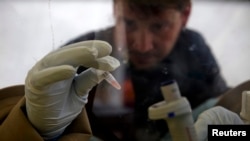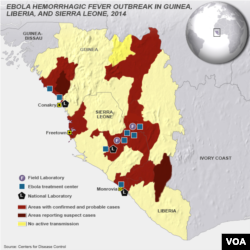The United States is sending more health experts to the three West African countries struggling with an Ebola outbreak. The experts will help the governments of Liberia, Sierra Leone and Guinea manage the crisis.
Thomas Frieden, director of the U.S. Centers for Disease Control and Prevention, addressed what he called the biggest and most complex Ebola outbreak in history, centered along the common border of Liberia, Sierra Leone and Guinea.
"Over the next 30 days, we plan to send an additional 50 CDC disease control specialists into the three countries," he said. "These individuals will help countries establish emergency operations centers that can develop a structured and effective way of addressing the outbreak."
"This is being done in close collaboration with WHO," he added. 'They will also help strengthen laboratory networks so testing for the disease can be done rapidly ... and third, building the capacity of individuals from within the area to do these functions for this outbreak and future threats as well."
He identified two major challenges those governments face in trying to control the situation.
"Many of the health systems in these countries are not highly functional," he said. "They may not reach into rural areas, health care workers may not reliably be present at facilities, and facilities may have very limited capacities. Second, in some areas, there has been lack of understanding and hostility or violence against some of the groups that are trying to respond to the outbreaks."
Among the CDC experts headed to the region will be airport screeners to help countries identify travelers who may be sick. Frieden also announced a more urgent travel alert, advising Americans to avoid any non-essential trips to the area.
He reviewed three key steps to stop the outbreak: rapidly identifying and isolating patients, finding and following anyone they had contact with over the previous three weeks to see if they develop symptoms; providing supportive care in treatment centers; and preventing future cases through education, strict adherence to quarantine protocols, and avoiding the consumption of bush meat and bats.
Comparing the effort to fighting forest fires, Frieden said "if you leave behind even one burning ember, one case undetected, it could reignite the epidemic."
"So difficult as it is, it can be done," he added. "And I am confident that as we make progress over the coming weeks and months, we will not only begin to tamp down these outbreaks, but leave behind a stronger system that will be able to find, and stop before they spread and prevent more effectively Ebola and other health threats."
Frieden concluded, this is a marathon, not a sprint, warning it will take three to six months to get the situation under control.





